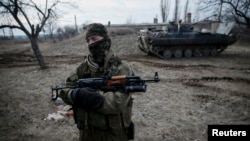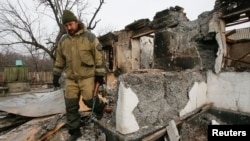President Barack Obama said on Monday the United States and its European allies remain committed to finding a diplomatic solution to tensions with Russia over Ukraine.
“Even as we continue to work for a diplomatic solution we are making it clear again today that if Russia continues on its current course, which is ruining the Russia economy and hurting the Russian people, as well as having such a terrible effect on Ukraine, Russia's isolation will only worsen both politically and economically,” Obama said.
He warned that the West cannot allow Russia to redraw Europe's borders "at the barrel of a gun," adding that Moscow is continuing its "aggression" against Ukraine, sending in tanks and artillery to support separatists in violation of last September's cease-fire agreement.
German Chancellor Angela Merkel, speaking at a joint news conference with the U.S. leader, said that while there have been setbacks in reaching a diplomatic solution with Russia over Ukraine, she does not see a military solution to the conflict.
Discussions
Merkel came to the White House Monday for talks with Obama on a wide range of issues. Topping their agenda are the fighting in Ukraine and the international coalition against the Islamic State group.
The two leaders said the U.S. and Europe stand united to find a diplomatic solution to end the crisis in Ukraine and the resulting stand-off it triggered between Russia and Western allies.
Obama also said Monday his administration is looking at all options in handling the crisis in Ukraine, but he has not yet decided whether the United States will provide arms.
“The possibility of lethal defensive weapons is one of those options that is being examined, but I have not made a decision about that yet," he said.
He said there is no "specific point" at which lethal defensive weapons would be "appropriate."
But he said he had instructed key advisors to examine the plausibility of supplying Kyiv with weaponry, in the event that diplomacy fails to bring peace. Ukraine leaders insist that such hardware is necessary to offset recent rebel military gains and end the uprising near the Russian border.
Merkel opposes arming Ukraine forces for fear of escalating tensions with Moscow, already at their highest point since the end of the Cold War. However, she added that no matter what Obama decides, "the alliance between the United States and Europe will continue to stand, will continue to be solid."
The U.S. and German leaders said they would "continue to encourage a diplomatic solution" and agreed that sanctions against Russia need to remain "fully in force" as long as it "continues on its current course."
Related video report by Henry Ridgwell:
French-German initiative
On Sunday, Merkel participated in four-way phone talks with the leaders of Ukraine, Russia and France on a French-German plan aimed at ending the surging rebellion in eastern Ukraine.
Merkel said abandoning the principle of territorial integrity, which is at the heart of the Ukraine crisis, would jeopardize "the peaceful order of Europe."
"For somebody who comes from Europe, I can only say, if we give up this principle of territorial integrity, we will not be able to maintain the peaceful order of Europe," Merkel said Monday. "It's essential."
Merkel and Ukrainian President Petro Poroshenko, Russian President Vladimir Putin and French President Francois Hollande agreed to meet Wednesday in Minsk, Belarus, for further discussions.
Details of those talks have not been disclosed, and it was not clear Monday whether separatist delegates would join Russian, Ukrainian and European envoys in the negotiations.
The French-German plan is based on September's failed cease-fire agreement signed in Minsk, but with more details on timing, according to a senior U.S. State Department official.
The fighting in Ukraine has claimed more than 5,600 lives since rebels launched their uprising 10 months ago. On Sunday, Poroshenko voiced optimism that a "swift and unconditional cease-fire" will be reached.
Despite that optimism, Putin warned that Ukraine must end its military operations near the Russian border. He also said Kyiv must end what he called punitive economic measures aimed at disrupting daily life in Russian-speaking eastern Ukraine.
For his part, French President Hollande said the upcoming talks present "one of the last chances" for reaching peace after nearly a year of fighting in eastern Ukraine.
Merkel, who has perhaps the most productive relationship with Putin of any Western leader, said, "I, myself, actually would not be able to live without having made this attempt" at finding a diplomatic solution.
Sanctions Delayed
In a related development, the European Union decided Monday to delay imposing sanctions on additional Ukrainian separatists and Russians to await the outcome of Wednesday's four-nation summit.
French Foreign Minister Laurent Fabius said the EU had agreed on the sanctions, which include asset freezes and travel bans against 19 people, including five Russians, and also target nine organizations, but that a decision to apply them would depend on the situation "on the ground."
Also Monday, Ukrainian military spokesman Andriy Lysenko said 1,500 Russian troops and 300 pieces of military equipment, including Grad missile systems, entered Ukraine from Russia over the past three days.
The Kremlin has repeatedly denied providing direct support to separatists in the Russian-speaking east and insists that Russian troops fighting alongside rebels are doing so as volunteers.
Fighting continues
A Kyiv military spokesman said Monday nine Ukrainian soldiers were killed and 26 wounded in fighting with Russian-backed separatists in Ukraine's eastern regions in the past 24 hours.
Ukraine's military said fighting has been particularly intense around the town of Debaltseve, a major rail and road junction northeast of the city of Donetsk.
Regional police chief Vyacheslav Abroskin said seven civilians had been killed by shelling in Debaltseve and another frontline town of Avdiivka on Sunday.
Also, a powerful explosion rocked a chemical plant and set it on fire late Sunday outside Donetsk.
Regional administration chief Ivan Prikhodko told Reuters the explosion occurred at a factory that produces explosives, artillery ammunition and aerial bombs.
Local residents said the explosion blew in windows of homes in parts of Donetsk, but no casualties or damage were immediately reported.
Donor conference planned
Meanwhile, international donors hope to raise $15 billion for Ukraine at a planned conference in Kyiv in April.
The effort, which is being spearheaded by the European Union and the United States, aims to save Ukraine from bankruptcy and help rebuild the country, according to an EU official.
Details and an exact date for the meeting will be worked out after Kyiv submits a list of its investment needs, said European Commissioner Johannes Hahn, who is responsible for the EU's neighborhood policy.
Commenting on the timing of the meeting, Hahn said, “We cannot wait until the conflict is settled.”
Some material for this report came from Reuters, AP and AFP.










